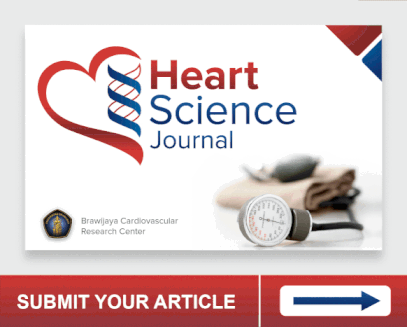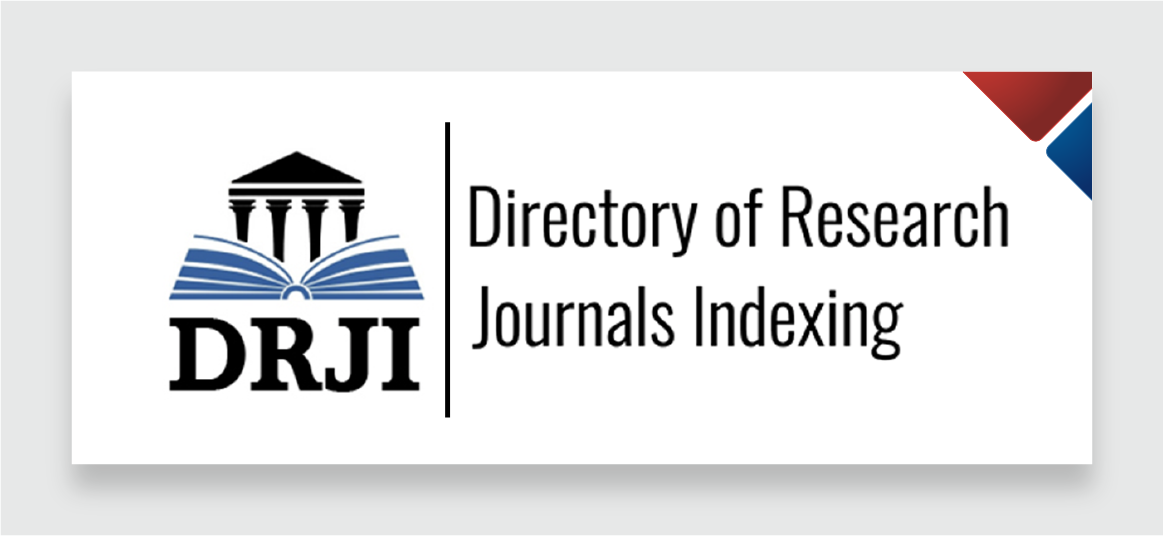Benefits of Low Dosage of Colchicine Administration on Decreasing Rehospitalization and Mortality within 30 Days in Post-Acute Coronary Syndrome Patients with ST-Segment Elevation Undergoing Percutaneous Coronary Intervention
Abstract
Background: The role of inflammation in myocardial infarction and post-infarction MI remodeling has become a concern for the development of treatment in the last decade. Colchicine can prevent increased inflammation during acute injury.
Objective: This study focused on the role of colchicine as an on-top medical treatment, hoping it can reduce mortality and short-term rehospitalization in patients with STEMI.
Methods: 347 AMI patients (18-80 year old adults) who visited RSUD dr. Saiful Anwar Malang, between February 2022 and January 2023, participated in this prospective, randomized, double-blinded, placebo-controlled
experiment. Patients were split into two groups and given either a placebo or colchicine 0.5 mg daily for a month. Standard medical therapy was administered concurrently to both groups as an approachable guideline. The study endpoints were mortality and rehospitalization rates.
Result: After one month of follow-up, there was a reduction in rehospitalization due to cardiovascular causes (2 [1.3%] vs. 4 [2.7%], HR 3.42 [1.36-8.56], p<0.05), which was significant in the treatment group compared to the control group. Also, there was a reduction in all-cause mortality, but not statistically significant (2 [1,3% v 3 [2,0%], HR 3,38 [0,53-7,48], p>0,05). In the treated group, there was also a lower non-cardiovascular rehospitalization rate compared to placebo, but not significant (4 [2.6%] vs. 7 [4.7], HR 0.42 [0.15-1.02], p<0.05).
Conclusion: The administration of low-dose colchicine for one month has shown benefits in reducing rehospitalization in patients with STEMI who receive PCI therapy.
Keywords
Full Text:
PDFReferences
Ibanez B, James S, Agewall S, et al. 2017 ESC Guidelines for the management of acute myocardial infarction in patients presenting with ST-segment elevation. Eur Heart J. 2018;39(2):119-177. doi:10.1093/eurheartj/ehx393
Appleton DL, Abbate A, Biondi-Zoccai GGL. Late percutaneous coronary intervention for the occluded infarct-related artery: A meta-analysis of the effects on cardiac function and remodeling. Catheter Cardiovasc Interv. 2008;71(6):772-781. doi:10.1002/ccd.21468
Darah IPJ dan P. Jumlah Penyakit Jantung di RSUD dr. Saiful Anwar Malang 2018-2019. Heart Sci J. 2018;39(2):119-177. doi:10.1093/eurheartj/ehx393
Minicucci MF, Azevedo PS, Polegato BF, Paiva SAR, Zornoff LAM. Heart failure after myocardial infarction: Clinical implications and treatment. Clin Cardiol. 2011;34(7):410-414. doi:10.1002/clc.20922
Robertson S, Martínez GJ, Payet CA, et al. Colchicine therapy in acute coronary syndrome patients acts on caspase-1 to suppress NLRP3 inflammasome monocyte activation. Clin Sci. 2016;130(14):1237-1246. doi:10.1042/CS20160090
Vrachatis DA, Papathanasiou KA, Giotaki SG, et al. Repurposing colchicine’s journey in view of drug-to-drug interactions. A review. Toxicol Rep. 2021;8(March):1389-1393. doi:10.1016/j.toxrep.2021.07.009
O’Brien LC, Mezzaroma E, Van Tassell BW, et al. Interleukin-18 as a therapeutic target in acute myocardial infarction and heart failure. Mol Med. 2014;20(1):221-229. doi:10.2119/molmed.2014.00034
Mewton N, Roubille F, Bresson D, et al. Effect of Colchicine on Myocardial Injury in Acute Myocardial Infarction. Circulation. Published online 2021:859-869. doi:10.1161/CIRCULATIONAHA.121.056177
Nidorf SM, Fiolet ATL, Mosterd A, et al. Colchicine in Patients with Chronic Coronary Disease. N Engl J Med. 2020;383(19):1838-1847. doi:10.1056/nejmoa2021372
Thygesen K, Alpert JS, Jaffe AS, et al. Organisation of reperfusion therapy for STEMI in a developing country. Eur Heart J. 2017;2(1):1-10. doi:10.1093/eurheartj/ehx393
Vaidya K, Martínez G, Patel S. The Role of Colchicine in Acute Coronary Syndromes. Clin Ther. 2019;41(1):11-20. doi:10.1016/j.clinthera.2018.07.023
Akrami M, Izadpanah P, Bazrafshan M, Hatamipour U, Nouraein N, Drissi HB, Manafi A. Effects of colchicine on major adverse cardiac events in next 6-month period after acute coronary syndrome occurrence; a randomized placebo-control trial. BMC Cardiovasc Disord. 2021 Dec 7;21(1):583. doi: 10.1186/s12872-021-02393-9. PMID: 34876021; PMCID: PMC8650300.Ridker PM, Everett BM, Thuren T, et al. Antiinflammatory Therapy with Canakinumab for Atherosclerotic Disease. N Engl J Med. 2017;377(12):1119-1131. doi:10.1056/NEJMoa1707914
Akodad M, Lattuca B, Nagot N, et al. COLIN : intérêt d’un traitement par colchicine dans l’infarctus du myocarde avec réponse inflammatoire. Arch Cardiovasc Dis. 2017;110(6-7):395-402. doi:10.1016/j.acvd.2016.10.004
Raju NC, Yi Q, Nidorf M, Fagel ND, Hiralal R, Eikelboom JW. Effect of colchicine compared with placebo on high sensitivity C-reactive protein in patients with acute coronary syndrome or acute stroke: a pilot randomized controlled trial. J Thromb Thrombolysis. 2012;33(1):88-94. doi:10.1007/s11239-011-0637-y
D’Amario D, Cappetta D, Cappannoli L, et al. Colchicine in ischemic heart disease: the good, the bad and the ugly. Clin Res Cardiol. 2021;110(10):1531-1542. doi:10.1007/s00392-021-01828-9
Martínez GJ, Robertson S, Barraclough J, et al. Colchicine Acutely Suppresses Local Cardiac Production of Inflammatory Cytokines in Patients With an Acute Coronary Syndrome. J Am Heart Assoc. 2015;4(8):e002128. doi:10.1161/JAHA.115.002128
Toldo S, Abbate A. The NLRP3 inflammasome in acute myocardial infarction. Nat Rev Cardiol. 2018;15(4):203-214. doi:10.1038/nrcardio.2017.161
Bouabdallaoui N, Tardif JC, Waters DD, et al. Time-to-treatment initiation of colchicine and cardiovascular outcomes after myocardial infarction in the Colchicine Cardiovascular Outcomes Trial (COLCOT).
Leung YY, Yao Hui LL, Kraus VB. Colchicine—Update on mechanisms of action and therapeutic uses. Semin Arthritis Rheum. 2015;45(3):341-350. doi:10.1016/j.semarthrit.2015.06.013
Swanson K V, Deng M, Diseases I, et al. The NLRP3 inflammasome: molecular activation and regulation to therapeutics. HHS. 2021;19(8):477-489. doi:10.1038/s41577-019-0165-0.The
DOI: https://doi.org/10.21776/ub.hsj.2023.004.03.6
Refbacks
- There are currently no refbacks.
Copyright (c) 2023 Budi Satrijo, Yordan Wicaksono Ashari, Mohammad Saifur Rohman, Setyasih Anjarwani, Cholid Tri Tjahjono

This work is licensed under a Creative Commons Attribution 4.0 International License.









